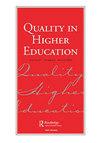Performance-based evaluation and funding model for central universities in India: a preliminary assessment
IF 1.1
Q3 EDUCATION & EDUCATIONAL RESEARCH
引用次数: 0
Abstract
Abstract The newly adopted performance-based evaluation and funding model is one of the recent quality initiatives taken by the University Grants Commission in India, which aims to improve quality in management and administration of federally funded universities in India. The article critically analyses the 2020 released ranking based on this model and raises some critical observations about the methodology and results of the ranking, discussing the key features of the ranking framework. The findings suggest that universities ranked higher in the National Institutional Ranking Framework and National Assessment and Accreditation Council ratings have performed not at par with their ranks in this target-based methodology. Only one university of 40 could find a place in the ‘outstanding’ category and one university was categorised as ‘poor’. The article goes on to discuss the current state and future directions of central universities in India aspiring to join the ‘world-class’ league.印度中央大学基于绩效的评价和资助模式:初步评估
新采用的基于绩效的评估和资助模式是印度大学教育资助委员会最近采取的质量举措之一,旨在提高印度联邦资助大学的管理和行政质量。本文基于该模型批判性地分析了2020年发布的排名,并对排名的方法和结果提出了一些批判性的看法,讨论了排名框架的关键特征。研究结果表明,在国家机构排名框架和国家评估和认证委员会排名中排名较高的大学的表现与他们在这种基于目标的方法中的排名不一致。在40所大学中,只有一所大学被列为“优秀”,一所大学被列为“差”。文章接着讨论了印度中央大学的现状和未来方向,这些大学渴望加入“世界级”联盟。
本文章由计算机程序翻译,如有差异,请以英文原文为准。
求助全文
约1分钟内获得全文
求助全文
来源期刊

Quality in Higher Education
EDUCATION & EDUCATIONAL RESEARCH-
CiteScore
3.30
自引率
14.30%
发文量
32
期刊介绍:
Quality in Higher Education is aimed at those interested in the theory, practice and policies relating to the control, management and improvement of quality in higher education. The journal is receptive to critical, phenomenological as well as positivistic studies. The journal would like to publish more studies that use hermeneutic, semiotic, ethnographic or dialectical research as well as the more traditional studies based on quantitative surveys and in-depth interviews and focus groups. Papers that have empirical research content are particularly welcome. The editor especially wishes to encourage papers on: reported research results, especially where these assess the impact of quality assurance systems, procedures and methodologies; theoretical analyses of quality and quality initiatives in higher education; comparative evaluation and international aspects of practice and policy with a view to identifying transportable methods, systems and good practice; quality assurance and standards monitoring of transnational higher education; the nature and impact and student feedback; improvements in learning and teaching that impact on quality and standards; links between quality assurance and employability; evaluations of the impact of quality procedures at national level, backed up by research evidence.
 求助内容:
求助内容: 应助结果提醒方式:
应助结果提醒方式:


